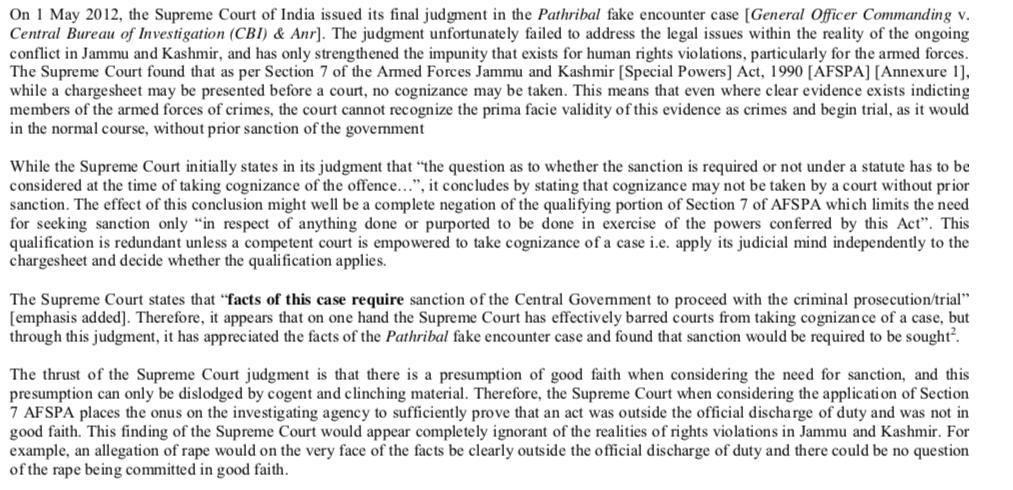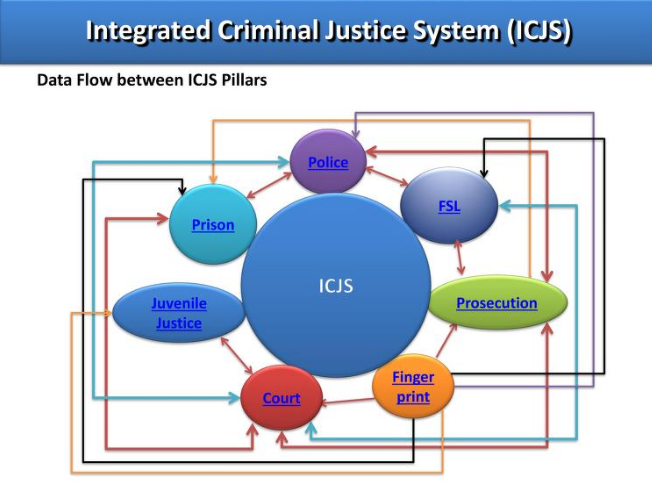Hi So this is going to be a longish thread on impunity in Kashmir. Over the last 2 days we’ve gotten a picture of the pervasiveness of human rts violations in Kashmir. Today we ask the question. Why. don’t the courts do something? Why is there no accountability for these crimes?
Let's begin with a quote from a High Court judge, Justice Rizvi made in a PIL filed by Advocate Jaleel Andrabi about illegal detentions and custodial deaths in 1995. Advocate Andrabi was himself tortured and killed in custody. The screen cap is from a @jkccs_ report on torture 

@jkccs_ sorry, 1994
@jkccs_ Ppl think impunity in Kashmir is abt AFSPA. But the immunity under AFSPA is only a tiny part bc only very few cases even reach stage of needing permission to prosecute. As the judge's remark suggests impunity is about "all sorts of illegalities" both by police and armed forces
@jkccs_ Remember the stages of the criminal justice process we spoke abt on Day1? 1. FIR 2. Investigations 3. Charge. 4.Trial. 5. Conviction/ Acquittal. (and there's a 6. Court martial) Impunity or lack of accountability for crimes by state starts with Day 1 and end at the Supreme Court
@jkccs_ Attributing the impunity in Kashmir only to special laws like AFSPA and PSA, actually invisiblises the massive amounts of everyday illegality and lawlessness that exists. It makes it sound as if reform or repeal could solve the problem, when it is systemic and pervasive
@jkccs_ A 2009 report "Myth of Normalcy" by Yale Law School's Human Right's Clinic gives a really good step-by-step overview of the forms of impunity that underlie every stage of the criminal justice system. Unfortunately I could only find a cached copy webcache.googleusercontent.com/search?q=cache…
@jkccs_ this review essay by Sanjay Kak in @thecaravanindia is also really great introduction to the slow, deadly apparatus of impunity (paywalled, though :( )
caravanmagazine.in/reportage/appa….
The report it's based on is jkccs.files.wordpress.com/2017/05/allege…
caravanmagazine.in/reportage/appa….
The report it's based on is jkccs.files.wordpress.com/2017/05/allege…
@jkccs_ @thecaravanindia So let's break it down. When a crime occurs in Kashmir in which the armed forces are involved, police refuse to register a FIR. At the risk of repeating myself this has NOTHING to do with AFSPA -- AFSPA does not say you can not file an FIR against an army man
@jkccs_ @thecaravanindia AFSPA only gives the army certain special powers (like shoot to kill in case of unlawful assembly, or search and seizure) and in case of crimes done during exercise of these special powers (including killings and bizarrely rapes) you need govt permission (sanction) to prosecute
@jkccs_ @thecaravanindia Police MUST register all complaints u s.154 JK CrPC, but simply dont where forces are involved. In 1992 a (totally illegal) police directive was issued explicitly telling police stations not to file FIRs in such cases. (Letter No: SP (5Exg/267881 dated 14.4.1992)
@jkccs_ @thecaravanindia Here's an extract from a HC case abt the extra judicial killing of 4 men by BSF , where the victims have been approaching the court for over a year just to get the FIR filed, which mentions the SSP's letter 

@jkccs_ @thecaravanindia In a case like Kunan Poshpora, where over 50 women were mass and gang raped, and over 100 men tortured during a "crackdown"in Kupwara in february 1991 it took 2 weeks of protests and an inquiry by a District Magistrate before an FIR was finally lodged.
@jkccs_ @thecaravanindia And just in case you think this is a phenomenon of the past , here are 2 cases from 2013 (about a killing in2010 ) and 2017 (abt a killing in 2016 ) , where families are still battling in the courts to get a FIR lodged kashmirreader.com/2017/11/08/pol… greaterkashmir.com/news/kashmir/3…
@jkccs_ @thecaravanindia This is not surprising given the Supreme Court's views on the question, where it stayed a pending investigation against an Army Major, and stated "he was an officer not a criminal" newsclick.in/centre-says-to…
@jkccs_ @thecaravanindia In many cases, of civilian killings instead of lodging an FIR on the complaint of the victim's family-- the police file cases (of rioting / incitement and other "stone pelting" offences) against the dead person insteadd alleging he was breaking the law kashmirreader.com/2016/05/handwa…
@jkccs_ @thecaravanindia Let's move on to the next stage Investigations are rarely,where an accused can be identified and charged. In the 1990s there were 100s of Habeas Corpus cases, where magesterial inquiries unearthed key facts, yet many such cases still remain "open" but w/ no progress to date
@jkccs_ @thecaravanindia The failure to investigate continues despite orders by the High Court, and repeated contempts filed by the victims families. Police dont record statements, dont collect any evidence, and the army even if approached, refuses to co-operate in any way despite court orders
@jkccs_ @thecaravanindia Reports such as "Alleged Perpetrators" which documents 100s of such legal cases, are replete with instances of army stonewalling police summons and court orders for years
@jkccs_ @thecaravanindia Then we have the filing of charges. this as may be clear by now , is rarely done in human rights cases. But in some high profile cases, where victims and lawyers have refused to give up charges do finally get filed -- but after decades of struggle
@jkccs_ @thecaravanindia And when finally filed they are in the form of a closure report, saying there is no prosecutable evidence in Kunan Poshpora mass rape it took 22 years, In Sopore Massacre 25 years , leading to a new round of litigation by victims to reopen investigations kashmirlife.net/justice-denied…
@jkccs_ @thecaravanindia And now finally we get to the stage of the sanction,under section 7 of AFSPA As this 2015 @Amnesty report documents. No case in Kashmir has ever been awarded sanction, but very very few cases can even get to this stage amnesty.org/en/latest/news…
@jkccs_ @thecaravanindia @amnesty The Patribal judgment which states that the magistrate cannot take "cognisance" of a chargesheet in a case involving Army, and leaves it to Army to chose it's forum (civil court or court martial) effectively means that ALL army acts are seen as done in the course of duty
@jkccs_ @thecaravanindia @amnesty It's a complicated reasoning-- but summarised here fairly simply : 

@jkccs_ @thecaravanindia @amnesty So the only way in which crimes by forces can actually be tried, is in a court martial secret military proceedings w soldiers as judges-- a system decried in International human rights law for being obviously biased heavily in favour of accused soldiers
humanrightsinitiative.org/in-the-news/ka…
humanrightsinitiative.org/in-the-news/ka…
@jkccs_ @thecaravanindia @amnesty Not surpisingly, in the Patribal fake encounter case, despite a CBI chargesheet and very strong evidence, all five accused officers were acquitted hrw.org/news/2014/01/2…
@jkccs_ @thecaravanindia @amnesty Even where a court martial finds soldiers guilty, as they did in the Machil extra judicial killings case of 2010, the verdict is almost invariably over turned on appeal: thewire.in/government/mac…
@jkccs_ @thecaravanindia @amnesty And there you have it-- the apparatus of delay, and legalization of impunity, that prevents any possibility of redress for Kashmiri victims of Indian state crimes.
@jkccs_ @thecaravanindia @amnesty I'm going to sign off now, but will be back tomorrow , when we'll talk about Habeas Corpus (though we did some habeas talk today as well), and how the writ of liberty works in a context of impunity and lawlessness
• • •
Missing some Tweet in this thread? You can try to
force a refresh







